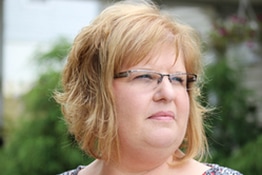|
A Conversation with the Executive Director  Executive Director, Sharon Glick Executive Director, Sharon Glick Sharon Glick has been in charge of the day-to-day operations of Gemeinschaft Home for almost four years, and her commitment to the residents and staff has never been greater. There is rarely a dull moment in Executive Director, Sharon Glick’s office, a cozy corner space located within the bustling reception and administration area of the house. With natural light pouring into the room from a large window—which she prefers over the fluorescent lighting overhead—Glick, known informally as "Ms. Sharon" to the residents and staff, spends most of her day either behind her computer desk or seated at a small table, engaged in near constant discussions with a steady stream of people trickling in and out of her workspace on any given day. “My door is always open, which does drive some of my staff crazy, but unless I am working on something I need to finish, I will always stop,” she explains, but adds that such flexibility just goes with the territory of the job—“You never know what it going to go on here.” Her open-door policy applies to everyone, staff as well as the residents, and serves as a metaphor for Glick’s leadership philosophy, an approach that embodies her effort to create a team-based community. “Executive Director, “ she says, “that’s just my title, but that doesn’t define who I am.” In fact, when residents arrive at Gemeinschaft Home, and Glick is currently in the office, she says, “I just go out and tell them, ‘I am Sharon. What’s your name?” She also explains, “I call residents by their first names. I may have to ask for a reminder, but generally I remember all of their names.” The rapport that Glick develops with residents stems in part from a choice she makes early on regarding their past experiences. “I do not read their jackets [case files with each resident’s criminal history] before they get here, she says, “Most of the gentlemen go completely through [the program], and I never open it, because the person who is demonstrated on paper, is just from one period of time in [his] life.” Instead she focuses on the present moment, with an eye on the future, and she encourages residents to do the same. Glick argues, “We have to show grace and forgiveness, because some of these guys have not been brought up in an environment that says, ‘You messed up today [or yesterday], but it’s ok. We’ve dealt with it; we move on.” Yet, moving forward presents a range of difficulties for many of the residents who work to transition from being incarcerated to living in society at large. “Guys don’t deal with the change easily,” Glick says, “We work on flexibility. We deal with anxiety. We deal with all sorts of stuff,” and “I constantly tell them that time is their friend. They don’t have to go from point A to point Z in 2 seconds.” She explains that many residents struggle with regaining or repairing connections with alienated family members, spouses, and making up for lost time with their children. Therefore much of Glick’s interactions with residents is aimed at helping them to slow down and to focus on their own progress in the program as the means to reaching their long-term family and relationship goals down the road. While wearing a number of hats in the role of director—managing staff, communicating with Department of Corrections probation and parole officers, meeting with board members, donors, and visitors—“I cannot imagine doing anything else,” Glick proclaims as she nears her fourth year in the position, but her interactions with the residents of Gemeinschaft Home provide the greatest reward. “People often speak of how much my staff and I invest in the residents, but I tell people that they have no idea how much they touch us, and it is far more than we give them,” Glick says, and she believes, “There is good in everybody. They just went through a period of time, but that time does not define who they are; they definitely touch my life.” “There is always some sort of circumstance, or a crisis, or something happening,” but “I choose to put myself in their lives. I could just shut the door, and I could easily get all of my bookkeeping and similar work done,” says Glick. Instead she prefers a more involved relationship with the people who make Gemeinschaft Home what it is--the residents. Her advice to them: “If you can’t change it, do not get stuck in it; do not dwell on it. There is no point in dwelling on [the past]. Make today all it can be. Live today like it’s your last day.” “I don’t tell them anything different than what I try to practice myself,” she concludes. Comments are closed.
|
Archives
August 2023
|